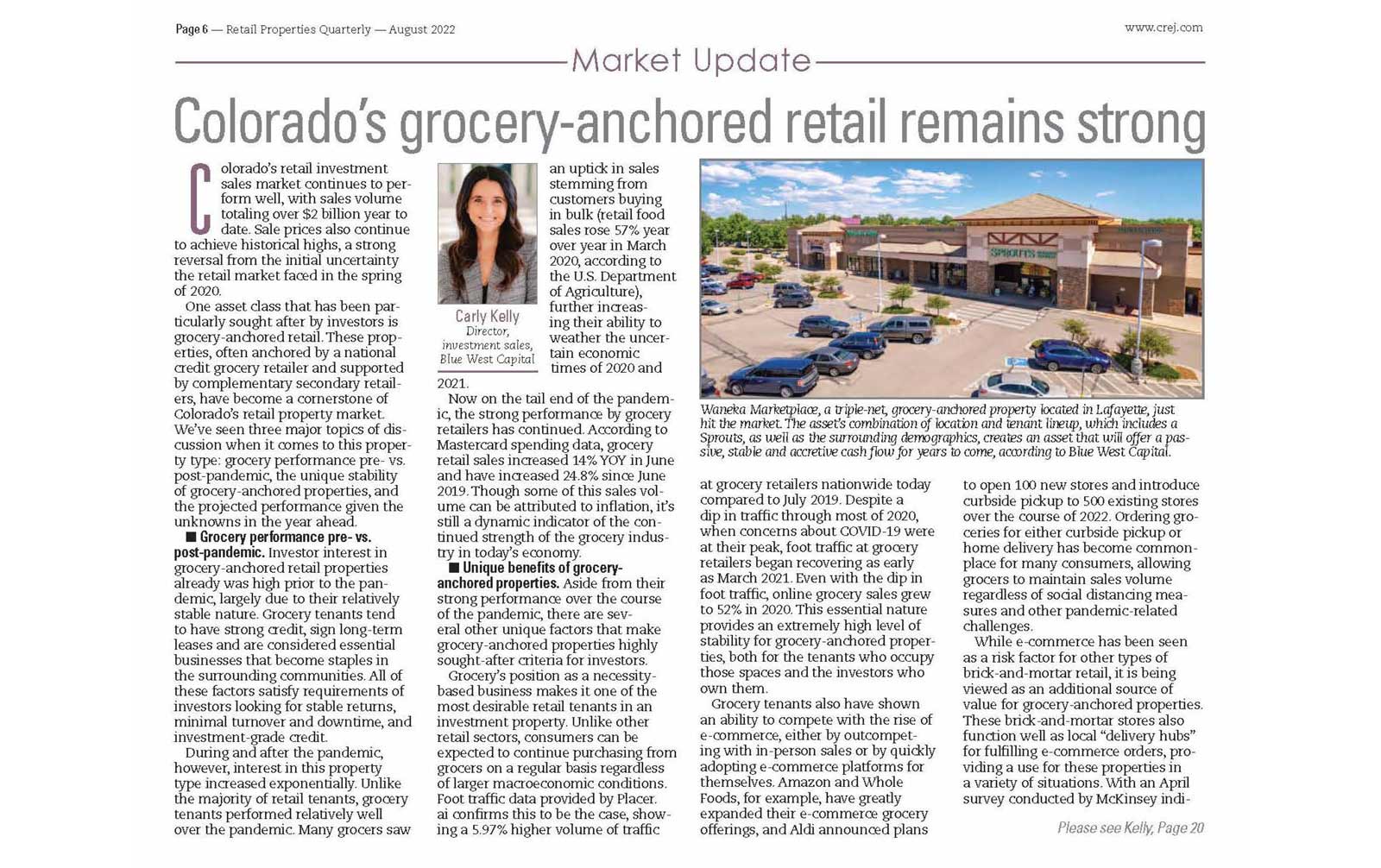written by Carly Kelly, published in CREJ
Colorado’s retail investment sales market continued to perform well this quarter, with sales volume totaling over $2 billion year-to-date. Sale prices also continue to achieve historical highs, a strong reversal from the initial uncertainty the retail market faced in the Spring of 2020.
One asset class that has been particularly sought after by investors is grocery-anchored retail. These properties, often anchored by a national credit grocery retailer and supported by complementary secondary retailers, have become a cornerstone of Colorado’s retail property market. We’ve seen three major topics of discussion when it comes to this property type, including grocery performance pre- vs post-pandemic, the unique stability of grocery-anchored properties, and the projected performance given the unknowns in the year ahead.
Grocery Performance Pre- vs Post-Pandemic
Investor interest in grocery-anchored retail properties was already high prior to the COVID-19 pandemic, largely due to its relatively stable nature. Grocery tenants tend to have strong credit, sign long-term leases, and are also considered essential businesses that become staples in the surrounding communities. All of these factors satisfy requirements of investors looking for stable returns, minimal turnover and downtime, and investment-grade credit.
During and after the pandemic, however, interest in this property type has increased exponentially. Unlike the majority of retail tenants, grocery tenants performed relatively well over the pandemic. Many grocers saw an uptick in sales stemming from customers buying in bulk (retail food sales rose 57% YOY in March 2020 according to the USDA), further increasing their ability to weather the uncertain economic times of 2020 and 2021.
Now on the tail end of the pandemic, the strong performance by grocery retailers has continued into 2022. According to Mastercard spending data, grocery retail sales increased 14% YOY in June 2022, and have increased 24.8% since June 2019. Though some of this sales volume can be attributed to inflation, it’s still a dynamic indicator of the continued strength of the grocery industry in today’s economy.
Unique Benefits of Grocery-Anchored Properties
Aside from its strong performance over the course of the pandemic, there are several other unique factors that make grocery-anchored properties highly sought-after criteria for investors.
Grocery’s position as a necessity-based business makes it one of the most desirable retail tenants in an investment property. Unlike other retail sectors, consumers can be expected to continue purchasing from grocers on a regular basis regardless of larger macroeconomic conditions. Foot traffic data provided by Placer.ai confirms this to be the case, showing a 5.97% higher volume of traffic at grocery retailers nationwide today compared to July 2019. Despite a dip in traffic through most of 2020 when concerns about COVID were at their peak, foot traffic at grocery retailers began recovering as early as March 2021. Even with the dip in foot traffic, online grocery sales grew to 52% in 2020. This essential nature provides an extremely high level of stability for grocery-anchored properties, both for the tenants who occupy those spaces and the investors who own them.
Grocery tenants have also shown an ability to compete with the rise of e-commerce, either by outcompeting with in-person sales or by quickly adopting e-commerce platforms for themselves. Amazon and Whole Foods, for example, have greatly expanded their e-commerce grocery offerings, and Aldi announced plans to open 100 new stores and introduce curbside pick-up to 500 existing stores over the course of 2022. Ordering groceries for either curbside pick-up or home delivery has become commonplace for many consumers following the pandemic, allowing grocers to maintain sales volume regardless of social distancing measures and other pandemic-related challenges.
While e-commerce has been seen as a risk factor for other types of brick-and-mortar retail, it is being viewed as an additional source of value for grocery-anchored properties. These brick-and-mortar stores also function well as local “delivery hubs” for fulfilling e-commerce orders, providing a use for these properties in a variety of situations. With an April 2022 survey conducted by McKinsey indicating e-commerce penetration into the grocery industry will double in the next five years, it should be expected that the value and pursuit of grocery-anchored retail properties will continue to increase exponentially.
Unknowns in the Year Ahead
Colorado’s retail investment sales market continues to exceed performance expectations. Denver’s market, for example, saw sale prices increase to upwards of $250 per square foot this quarter, and cap rates compressed to nearly the 6% mark according to CoStar. Following a period during the pandemic when some experts questioned brick-and-mortar’s future, this is a great demonstration of the asset class’s resilience.
With that said, there are many anticipated economic headwinds the market will be facing through the end of 2022. The Federal Reserve’s move to increase its benchmark rate by an additional 0.75 percentage points in July is a continuation of its inflation-fighting efforts that will undoubtedly impact commercial real estate markets nationwide. Though there is a mixed sentiment on whether we have officially entered a recession, investors are already showing signs of a shift towards recession preparations that could cause a deceleration of the retail investment sales market. The recession we thought we were entering in early 2020 could very well be materializing in the latter part of 2022.
Despite this, grocery-anchored retail’s “recession-proof” nature should set the asset class up well for continued sales volume and investor demand.
Be the first to know about new investment properties.
Subscribe to our mailing list





